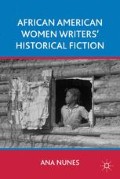Abstract
My interest here is to consider a number of texts that significantly determined the development of twentieth-century African American women’s writing. Issues from the accuracy of portraits of black American experience to the establishment of an exceptional literary tradition are evident in the work published particularly in the latter part of the nineteenth century. My focus is not simply on the themes addressed but also on the terms of narrative strategies and how literature and politics are closely linked.
I would like to do something of lasting service for the race.
—Frances Ellen Watkins Harper
Access this chapter
Tax calculation will be finalised at checkout
Purchases are for personal use only
Preview
Unable to display preview. Download preview PDF.
Notes
John Hope Franklin and Alfred A. Moss, From Slavery to Freedom: A History of African Americans (New York: McGraw Hill, 1994), 250.
W. E. B. Du Bois, as quoted by Herbert Aptheker in A Documentary History of the Negro People in the United States: From the Reconstruction Era to 1910 (New York: Citadel, 1951), 753
Frances Smith Foster, introduction to Iola Leroy, or, Shadows Uplifted, by Frances E. W. Harper (New York: Oxford University Press, 1988), xxx-xxxi.
Frances E. W. Harper, as quoted by Melba Joyce Boyd in Discarded Legacy: Politics and Poetics in the Life of E. W. Harper, 1825–1911 (Detroit, MI: Wayne State University Press, 1994), 40.
Hazel V. Carby, Reconstructing Womanhood: The Emergence of the Afro-American Woman Novelist (New York: Oxford University Press, 1987), 66.
Frances E. W. Harper, Minnie’s Sacrifice, Sowing and Reaping, Trial and Triumph: Three Rediscovered Novels (Boston: Beacon, 1994), 91.
Jacqueline K. Bryant, The Foremother Figure in Early Black WomensLiterature: Clothed in My Right Hand (New York: Garland, 1999), 73.
See Frances E. W. Harper, Iola Leroy, or, Shadows Uplifted (New York: Oxford University Press, 1988), 97–98.
Mary Prince, The History of Mary Prince, A West Indian Slave: Related by Herself in Six Women’s Slave Narratives (New York: Oxford University Press, 1988), 11.
Harriet Jacobs, Incidents in the Life of a Slave Girl, ed. Henry Louis Gates Jr. (New York: Oxford University Press, 1988), 6.
M. Giulia Fabi, “Reconstructing Literary Genealogies: Frances E. W. Harper’s and William Dean Howells’s Race Novels,” in Soft Canons: American Women Writers and Masculine Tradition, ed. Karen L. Kilcup (Iowa City: University of Iowa Press, 1999), 60.
Benjamin F. Lee, introduction to The Work of Afro-American Women by Gertrude N. F. Mossell (Philadelphia: George S. Ferguson, 1908), 4.
Frances E. W. Harper, “Woman’s Political Future,” address in The World’s Congress of Representative Women, ed. May Wright Sewall (Chicago: Rand McNally, 1894), 433–37. Accessed December 17, 2010, http://babel.hathitrust.org/cgi/pt?id=uc1.b3713658.
Fannie Barrier Williams, “The Intellectual Progress of the Colored Women of the United States since the Emancipation Proclamation,” address in The World’s Congress of Representative Women, ed. May Wright Sewall (Chicago: Rand McNally, 1894), 696–711. Accessed December 17, 2010, http://babel.hathitrust.org/cgi/pt?id=uc1.b3713659.
A. J. Cooper, “Discussion of the Same Subject [The Intellectual Progress of the Colored Women of the United States Since the Emancipation Proclamation],” address in The World’s Congress of Representative Women, ed. May Wright Sewall (Chicago: Rand McNally, 1894), 711–15. Accessed December 17, 2010, http://babel.hathitrust.org/cgi/pt?id=uc1.b3713659.
Copyright information
© 2011 Ana Nunes
About this chapter
Cite this chapter
Nunes, A. (2011). Contexts. In: African American Women Writers’ Historical Fiction. Palgrave Macmillan, New York. https://doi.org/10.1057/9780230118850_2
Download citation
DOI: https://doi.org/10.1057/9780230118850_2
Publisher Name: Palgrave Macmillan, New York
Print ISBN: 978-1-349-29449-7
Online ISBN: 978-0-230-11885-0
eBook Packages: Palgrave Literature CollectionLiterature, Cultural and Media Studies (R0)

